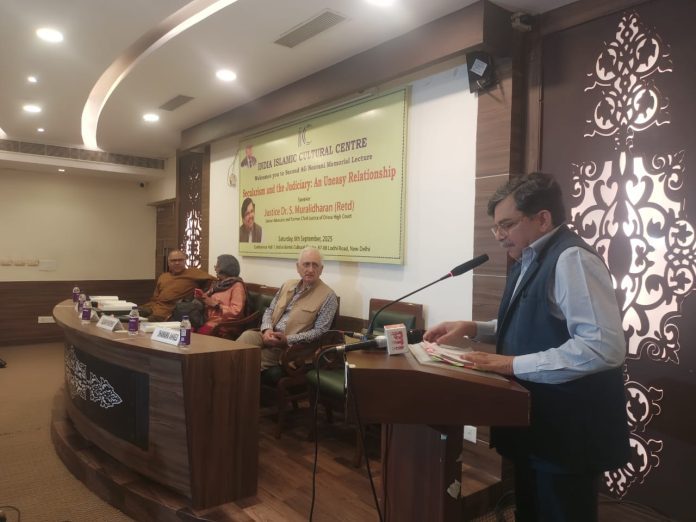New Delhi: Former Chief Justice of Orissa High Court, Justice S. Muralidhar, delivered the second A.G. Noorani Memorial Lecture on “Secularism and the Judiciary: An Uneasy Relationship” at the India Islamic Cultural Centre. He reflected on the judiciary’s mixed record in upholding India’s secular fabric, offering sharp criticism of landmark judgments and institutional failures.
Justice Muralidhar began by honouring A.G. Noorani, describing his writings as thorough, fearless, and grounded in evidence. He stressed that Noorani’s legacy should inspire jurists to speak truth without fear.
He described secularism as a constitutional guarantee of equal respect for all faiths. Recalling childhood visits to Nagapattinam, where temples, dargahs, and churches coexist, he called this coexistence India’s “composite culture.”
Much of his lecture focused on the Babri Masjid case. He traced events from the 1885 Faizabad court warning of violence to the 1992 demolition. He condemned the Supreme Court’s 2019 Ayodhya ruling, noting that despite acknowledging the unlawful destruction of the mosque, the Court still handed over the land for a temple trust, which he termed judicial overreach.
He criticised the lack of accountability, pointing out how leaders who had pledged to protect the mosque went unpunished. Criminal trials ended in acquittals despite substantial evidence. He called this “institutional amnesia” and “a classic case of impunity.”
On current challenges, he highlighted the Places of Worship Act, 1991, as vital to maintaining harmony but warned against rising suits in Varanasi and Mathura. He also flagged the Hijab case, arguing that Indian secularism is about accommodation, not exclusion.
Justice Muralidhar urged consistency in judicial interpretation, insisting that secularism is non-negotiable under the Constitution.




